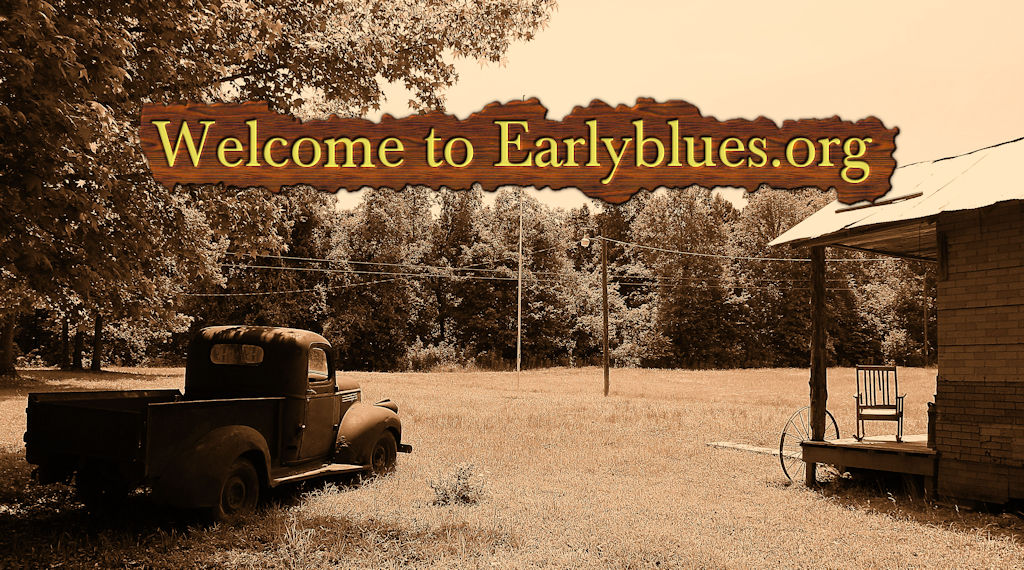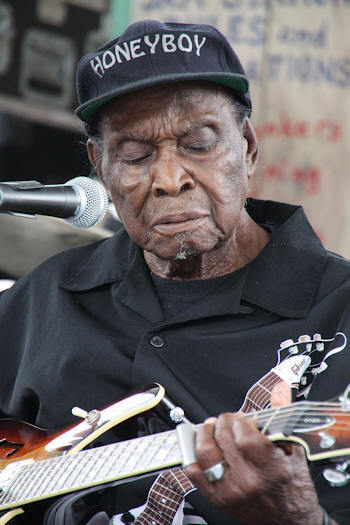‘David Honeyboy Edwards Obituary’ – by Keith Woods, from Tales From The Woods
Tales From The Woods raises a glass and says farewell to the last surviving pre-war delta blues musician, the wonderful David Honeyboy Edwards who passed away upon the 29th August [2011] age 96.
It seems incredible that into the first few years of this 21st Century it was still possible to witness the four surviving most important figures from a much earlier generation of pre-war Blues performing together on stage. Known as the Delta Blues Cartel, the group contained the legendary names of Robert Junior Lockwood, Homesick James, Henry Townsend, and Honeyboy Edwards. These great pioneers from what must surely have been a delta blues golden era were of an extremely advanced age, all being in their nineties. Honeyboy at that time was marginally younger, just a stripling in his eighties. Sadly Homesick, Henry and Robert left us in quick succession during 2006 leaving Honeyboy to spend his remaining years, very much in the manner of his previous eight decades, as a roaming ambassador of the music so admired and cherished throughout the globe.
Part of the publicity surrounding the Delta Blues Cartel was that most of these veterans had encountered the near mythical figure of pre-war delta bluesman Robert Johnson. Unlike Johnson, Honeyboy had never sold his soul to the devil like that of the legend associated with his friend and mentor but played with him on street corners and in bars, throughout the delta towns. Present also at Johnson’s final gig, the night that a jealous man poisoned his drink “for messing with his woman”. Honeyboy was at the side of the deathbed that would cement the legend of Johnson into blues folk lore for ever. Thus for the remainder of his long life, he would become an informant of near priceless value for Blues historians, film makers and journalists, all wishing to pin down the elusive figure of one of the founding fathers of a later generation of the Blues. Honeyboy talks at length about him in the excellent 1991 documentary “Search For Robert Johnson”.
David Honeyboy Edwards was born in Shaw, Mississippi on 28th June 1915. He began learning the guitar as a small boy from his father who was a sharecropper on a cotton plantation. As a child he witnessed visiting blues musicians playing around the locality, including masters of the genre such as Charlie Patton and the man who would serve as his premier mentor and with whom he would travel the length and breadth of the southlands, the itinerant blues guitarist and singer Big Joe Williams.
The aforementioned encounters with Robert Johnson took place in the thirties. Come the early forties, whilst playing and singing in the streets of Clarksdale, Mississippi, he came across Alan Lomax who was on one of his many expeditions down south, song and folk lore collecting for the Library of Congress and would much later recall his initial impressions in the 1993 book “The Land Where The Blues Began”. Described thus “A black felt hat perched upon the back of his head, his powerful hands dancing along the neck of his guitar, he sucked and puffed with furious energy at the harmonica held up to his mouth on a steel frame.” The words created within the pages of the book present a fine image of the not yet thirty Honeyboy playing on the streets, at the time a natural environment for an itinerant blues musician. Lomax recorded several of Honeyboy’s performances although they failed to find a release at the time.
Following advice that Honeyboy had given him, he went to search out a local musician about whom word had been spreading fast for a while, McKinley Morganfield (a.k.a. Muddy Waters), not too many years away from travelling north to Chicago and iconic status. Honeyboy meanwhile kept travelling. His itinerant wanderings found him in Chicago on the eve of the city’s greatest blues period during those late forties through to the early fifties, joining harmonica legend Little Walter.
In Houston, Texas he recorded for ARC Records as Mr Honey, and under his real name for Sam Phillips in Memphis for the Sun Label. Back in Chicago he cut a number of sides for Chess in 1953, even enjoying a minor R&B hit with “Drop Down Mama”, which no doubt prompted him to quit his wandering ways and settle in the windy city where he became a mainstay of the Chicago scene.
As the fifties gave way to the sixties, finding himself increasingly marginalised by the emergence of Soul music into the consciousness of the public on both sides of the Atlantic, he recorded only sporadically and at times was forced to undertake factory work to supplement his income. The resurgence of interest in pre-war blues reignited the careers of many survivors from an earlier era and Honeyboy luckily would eventually benefit from these rewards.
As the seventies progressed he recorded albums for Trix and Folkways. An association began with Michael Frank, a young white blues fan, who founded the Earwig record label with whom he recorded albums of acclaim, “Old Friends” [1979] and “Roaming & Rambling” [2008] also playing the harmonica on Honeyboy’s gigs, travelling with him on tour in USA, Europe and Japan as well as managing his affairs for the remainder of his long life. No doubt one of the crowning glories was to perform at the prestigious Carnegie Hall, New York in 1979 fronting an all-star band which included Chicago veterans such as Sunnyland Slim and Walter Horton.
Inducted into the Blues Hall Of Fame in 1996, the following year his frank autobiography was published “The World Don’t Owe Me Nothing”. Come 2002 he was named a National Heritage Fellow by the National Endowment For The Arts, also being the subject of an excellent documentary “Honeyboy”. 2007 would see him making a cameo appearance in “Walk Hard: The Dewey Cox Story”, a pastiche of the tavern to stadium musical biopic in which he played the role of legend cum mentor to a precocious child.
Honeyboy’s long history in the blues gave opportunities galore to documentary makers with an interest in the genre, most notably the 2009 Jill Nicholls’ “Folk America: Birth Of A Nation” seen on our screens here on BBC 4. In the final years that followed the demise of the Delta Blues Cartel, his performances became patchworks of songs and stories from the deepest depths of his memory. He would finally receive his lifetime achievement award in 2009.
His last public performance was in April of this year, fittingly in Clarksdale, Mississippi at the Juke Joint Festival. He was scheduled to play further festivals during this summer in both the United States and Europe, but his declining health forced cancellations. Ironically on the day of his death he was booked to play a gig in Chicago.
I got to see Honeyboy Edwards play a couple of times, most notably in the intimate surroundings of the long vanished and still very much missed Weavers at London’s Newington Green. Sadly, witnessing the Delta Blues Cartel for me would prove not to be.
Keith Woods
Wikipedia Entry:
David “Honeyboy” Edwards (June 28, 1915 – August 29, 2011) was a Delta blues guitarist and singer from Mississippi.
Edwards was born in Shaw, Mississippi. At the age of 14, he left home to travel with the bluesman Big Joe Williams, beginning life as an itinerant musician, which he maintained through the 1930s and 1940s. He performed with the famed blues musician Robert Johnson, with whom he developed a close friendship. Edwards was present on the night Johnson drank the poisoned whiskey that killed him, and his story has become the definitive version of Johnson’s demise. Edwards also knew and played with other leading bluesmen in the Mississippi Delta, including Charley Patton, Tommy Johnson, and Johnny Shines. He described the itinerant bluesman’s life:
On Saturday, somebody like me or Robert Johnson would go into one of these little towns, play for nickels and dimes. And sometimes, you know, you could be playin’ and have such a big crowd that it would block the whole street. Then the police would come around, and then I’d go to another town and where I could play at. But most of the time, they would let you play. Then sometimes the man who owned a country store would give us something like a couple of dollars to play on a Saturday afternoon. We could hitchhike, transfer from truck to truck, or if we couldn’t catch one of them, we’d go to the train yard, ’cause the railroad was all through that part of the country then…we might hop a freight, go to St. Louis or Chicago. Or we might hear about where a job was paying off – a highway crew, a railroad job, a levee camp there along the river, or some place in the country where a lot of people were workin’ on a farm. You could go there and play and everybody would hand you some money. I didn’t have a special place then. Anywhere was home. Where I do good, I stay. When it gets bad and dull, I’m gone.
The folklorist Alan Lomax recorded Edwards in Clarksdale, Mississippi, in 1942 for the Library of Congress. Edwards recorded 15 album sides of music, including his songs “Wind Howlin’ Blues” and “The Army Blues”. He did not record commercially until 1951, when he recorded “Who May Be Your Regular Be” for Arc under the name Mr. Honey. Edwards claimed to have written several well-known blues songs, including “Long Tall Woman Blues” and “Just Like Jesse James.” His discography for the 1950s and 1960s amounts to nine songs from seven sessions. From 1974 to 1977, he recorded tracks for his first full-length LP, I’ve Been Around, released in 1978 by the independent label Trix Records and produced by the ethnomusicologist Peter B. Lowry. Kansas City Red played for Edwards for a brief period, and Earwig recorded them in 1981, along with Sunnyland Slim and Floyd Jones, for the album Old Friends Together for the First Time.
His autobiography, The World Don’t Owe Me Nothing: The Life and Times of Delta Bluesman Honeyboy Edwards, published in 1997 by the Chicago Review Press, recounts his life from childhood, his travels through the American South, and his arrival in Chicago in the early 1950s. A companion CD with the same title was released by Earwig Music. His long association with the Earwig label and with his manager, Michael Frank, led to several late-career albums on various independent labels from the 1980s on. He also recorded at a church turned recording studio in Salina, Kansas, and released albums on the APO label. Edwards continued the rambling life he described in his autobiography, touring well into his 90s.
His albums White Windows, The World Don’t Owe Me Nothin’, Mississippi Delta Blues Man, and a 2007 album on which he appears with Robert Lockwood Jr., Henry Townsend and Pinetop Perkins titled Last of the Great Mississippi Delta Bluesmen: Live In Dallas, were all nominated for the W. C. Handy Award. The latter album won a Grammy Award in 2008.
On July 17, 2011, Frank announced that Edwards would retire because of ill health.
Edwards died of congestive heart failure at his home on August 29, 2011, at about 3 a.m. According to events listings on the Metromix Chicago website, he had been scheduled to perform at noon that day, at the Jay Pritzker Pavilion in Chicago’s Millennium Park.
Further References:
https://www.nytimes.com/2011/08/30/arts/music/david-honeyboy-edwards-delta-bluesman-dies-at-96.html
https://www.theguardian.com/music/2011/aug/30/david-honeyboy-edwards-obituary
Image © copyright 2010 Alan White. All rights reserved.


